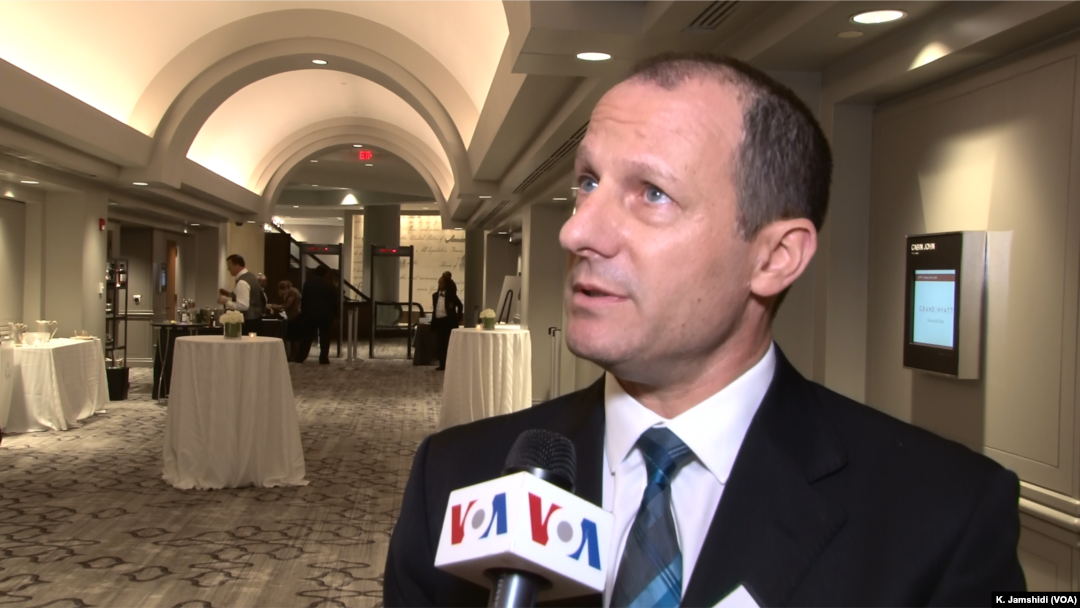A senior Israeli diplomat has welcomed Tuesday’s U.S.-North Korean agreement to denuclearize the Korean Peninsula, saying it puts more pressure on Israeli foe Iran to drop its own nuclear ambitions.
Speaking to VOA Persian at a pro-Israel event in Washington on Tuesday, Israel’s deputy chief of mission in Washington, Reuven Azar, said the U.S.-North Korean summit that led to the agreement is great news.
Azar said North Korea’s commitment to “complete denuclearization” of the Korean Peninsula, which followed the U.S. imposing its toughest-ever sanctions on Pyongyang, sends a key signal to Iran.
WATCH: Senior Israeli diplomat Reuven Azar speaks to VOA Persian's Michael Lipin
Your browser doesn’t support HTML5
Israeli Diplomat Welcomes US-North Korea Agreement
“It is very clear that this U.S. administration is not going to allow rogue regimes to acquire nuclear weapons,” Azar said. “I think (the summit) is a great sign to the Iranian people as well (because it) entails great hope for them in future, if the regime decides to renounce that dangerous (nuclear) program.”
Israel and its main Western ally, the United States, accuse Iran of seeking to become nuclear-armed, a prospect that Israel sees as an existential threat because of repeated calls by Iran’s Islamist rulers for the destruction of the Jewish state. Iran says its nuclear activities are solely peaceful.
Azar was speaking as about 400 pro-Israel activists gathered at Washington’s Grand Hyatt hotel on for an annual fundraising dinner for the Endowment for Middle East Truth, or EMET. The conservative-leaning advocacy group calls itself “unabashedly pro-American, pro-Israel” and seeks to educate policymakers and other Americans about Israel’s role as a U.S. ally in fighting radical Islam.
The event drew at least six U.S. lawmakers, including five Republicans and one Democrat — Congressman Josh Gottheimer, one of the few Democratic lawmakers who backed President Trump’s withdrawal from 2015 Iran nuclear deal last month. One of the Republicans in attendance, Congressman Ron DeSantis, told VOA Persian that President Trump should do more in the coming months than just re-impose Iran sanctions that the previous Obama administration lifted under the deal.
Republican Congressman Ron DeSantis speaks to VOA Persian in Washington, June 12, 2018.
“I do want the snap-back sanctions, but I think we need more sanctions,” DeSantis said. “You need to choke off the money to the Iranian regime, and the more problems they have with the cash flow, the more Iran’s Islamic Revolutionary Guard Corps hemorrhages funds. You also (need to) work to open social networks within Iran, so that people who are dissatisfied with the regime can communicate with one another. Then you are creating circumstances in which Iranians can choose a different course.”
Also speaking to VOA Persian at the event, Republican Senator Tim Scott said President Trump should focus on building support for sanctions among U.S. allies who have been reluctant to follow them.
Republican Senator Tim Scott talks to VOA Persian in Washington, June 12, 2018.
“It’s a fairly complicated situation as it relates to the global response (to U.S. sanctions),” Scott said. “What we have done is the most appropriate response for us. The president will continue to have positive conversations that I think will hopefully lead us in the direction of having a concerted effort (with our allies on sanctions). So I’m hopeful as it relates to what will be the final outcome.”
WATCH: Iran analyst Behnam Ben Taleblu speaks to VOA Persian's Farhad Pouladi about how the U.S.-North Korean summit will impact North Korean cooperation with Iran
Your browser doesn’t support HTML5
Iran Analyst Behnam Ben Taleblu of Washington’s Foundation for Defense of Democracies
In a separate VOA Persian interview on Wednesday, Iran analyst Behnam Ben Taleblu of Washington’s Foundation for Defense of Democracies said President Trump also needs more North Korean concessions before he could achieve the goal of preventing Iran from developing nuclear weapons.
“If President Trump wants a ‘real deal’ with Iran, he cannot just get a promissory note or a promissory agreement with the Kim (Jong Un) regime (of North Korea). He has to get something substantive, and unless he gets something substantive, he will likely not have the leverage to engage in coercive diplomacy with Iran.”
At the EMET event, many participants showed support for stronger global economic sanctions on Iran, seeing that as the best way to peacefully resolve the Iranian nuclear dispute.
“We are giving our best shot because we want diplomacy to win in order to avoid war and confrontation in the future,” Azar said. “So we have to use economic pressure. We hope that that works.”
Farhad Pouladi and Kaveh Jamshidi of VOA’s Persian Service contributed to this report.


